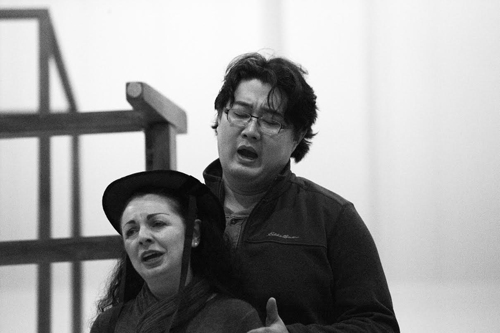By Vivian Nguyen
Northwest Asian Weekly

Nuccia Focile (Susanna) and Shenyang (Figaro) during a staging rehearsal for Seattle Opera’s upcoming production of “The Marriage of Figaro” (Photo by Philip Newton)
To Shenyang, a Chinese bass-baritone singer, his name represents a bridge between the opera performer’s Chinese roots and his international reputation.
“My full name, pronounced from first to last (Yang Shen), sounds like a ‘goat’s kidney’ in Chinese,” said Shenyang.
“It doesn’t sound great when I hear it.” Given Western media’s practice of listing a subject’s name first to last, Shenyang combined his two names to avoid confusion.
Now, his name sounds like a famous pop singer’s, he said jokingly.
The one-word ‘diva’ name might be appropriate for Shenyang. In recent years, he has become one of the most talked-about young singers in opera. Shenyang’s parents were also professional musicians and met at a music conservatory in China. Growing up in Tianjin, China, Shenyang lived in a household where Michael Jackson and opera shared equal presence.
“This was normal to me — hearing and having opera in my life,” said Shenyang. “Most kids in China are forced to learn something practical, and there’s no real appreciation of art. But for me, I was a music lover. I’ve always been drawn to music and have believed that I was born for [singing].”
At 16, Shenyang’s voice changed into the deep, velvet tone that he is known for today, prompting him to pursue opera as a profession. He attended the Shanghai Conservatory of Music a few years later, where he took a class from renowned soprano singer Renée Fleming. Floored by his talent and booming voice, Fleming arranged for Shenyang to receive vocal coaching at the Metropolitan Opera in New York, effectively opening doors for Shenyang to step onto the global stage.
“This was like an admission ticket to get involved in Western opera,” said Shenyang.
Shenyang moved to New York to train at the Metropolitan Opera, while taking courses at the prestigious Juilliard School. He won the coveted Cardiff Singer of the World Competition in 2007 — the event that prompted Shenyang to combine his name after receiving much attention from Western media — and he made his debut with the Metropolitan Opera in 2009, where he starred as Masetto in “Don Giovanni.”
“Opera used to be an art that belonged to the Western world, but in the late 20th century, it has since become more universal,” said Shenyang. The genre is more accessible than people think, he believes, and one that deserves more recognition.
When it comes to performing in a music genre known predominantly for white singers and characters, Shenyang said race doesn’t affect how he views his roles.
“I’ve met some [Asian] singers who think, ‘We need to be more Westernized.’ That’s fake. You can never fully be Western,” said Shenyang. “What you need to do is understand the cultural difference by learning the language of the character, how to act out the character’s intentions, and the details that follow. This is the actual art — performing a certain character on stage. It’s not about the difference of skin color.”

Shenyang (Photo by Montblanc-Johannes Ifkovits)
Shenyang will live up to his words in his debut at the Seattle Opera this week. The singer stars at the titular character in “The Marriage of Figaro,” a popular Italian opera composed by Wolfgang Amadeus Mozart. Known also by its original Italian name “Le Nozze di Figaro,” the comedy is one of the most-performed operas worldwide and is Mozart’s most popular.
“The Marriage of Figaro has something for everyone,” the Opera’s General Director Aidan Lang said in a release.
“This is the story of one madcap day, a day where people’s follies are exposed for all to see and laugh at, but one which concludes with one of opera’s greatest scenes of forgiveness and reconciliation. While these characters are highly flawed, they’re also drawn with a warm humanity we can all relate to.”
Seattle audiences are well-positioned to appreciate and enjoy this run of “The Marriage of Figaro,” according to Shenyang. The Seattle Opera has a rich history of tackling challenging operas, particularly those of Richard Wagner’s. From their long lengths to difficult string work for instrumentalists, performing Wagnerian works are no easy feat. The Seattle Opera has created a tradition of successfully producing Wagnerian operas — something that Shenyang says is as “valuable and rare as a panda.”
“Opera lovers in Seattle are very educated and informed with a high standard of taste,” said Shenyang. “There are few audiences elsewhere that can fully appreciate an opera like [‘The Marriage of Figaro’].” (end)
“The Marriage of Figaro” will run at McCaw Hall from Jan. 16–30. English subtitles are available. For more information, visit www.seattleopera.org.
Vivian Nguyen can be reached at info@nwasianweekly.com.



